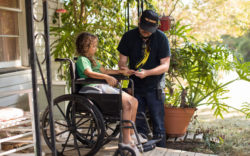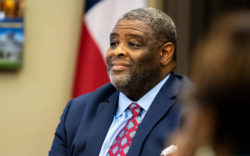The square concrete block building on Magnolia Street—the one with the curved glass block corner—is about to be made over for the next generation.
For 50 years, the building served as a hub for Athens’ African-American community, first as home to American Legion Post 535 in the 1950s and later as the first daycare for African-American children. At the height of its history, between 1950–1970, the Frank C. Maddox Center hosted concerts, receptions, meetings, social services and even a place of worship.
On a recent Thursday evening at the Greater Bethel AME Church next door, which owns the Frank C. Maddox Center, congregants and other community members announced plans for the next phase of the building’s life—one that will restore it to its former post-war glory, as well as its status as a community hub.
“We had been talking about fixing up the Maddox Center, but this just exceeded my expectations,” said Tommie Farmer, a member of Greater Bethel AME who has helped spearhead the project. “I am more hopeful now, and we will just keep on going.”
Farmer was reacting to plans unveiled at the meeting that showed how the building could look for the next generation. Designed by Arcollab Architectural Collaborative of Athens, drawings combine practical design aspects, such as a new support system for the roof and a change to the second-floor stairway to reveal that glass block wall when you enter the space, as well as modern updates that allow the space to work for the community.
Along with the drawings, Arcollab also worked with Greater Bethel members and Magnolia Street residents to come up with potential new uses for the building. Using these ideas, said Lori Bork Newcomer, founding principal of Arcollab, helped the design team plan a space that could accommodate meetings, events, concerts and classes—all ideas generated by the neighborhood.
“This is the bones of the space,” she told the audience as she walked them through exterior and interior drawings on display at the front of the sanctuary. “We tried to come up with ideas that were the most multipurpose. We really looked at it as a community center. It could be used for community meetings, banquets and a history center.”
Plans also call for a prep kitchen, rather than a full-scale commercial kitchen, to help save on renovation costs. A small addition on the back of the building accommodates this, as well as new bathrooms.
“The original building is Art Deco, with simple geometry and glass block, so we are trying to stay within that same geometry and pay homage to the original intentions of the building,” Newcomer added. “We realize the historic and cultural significance this building has on the community, and it is a privilege to work on the project.”
The unveiling of the drawings was just a first step in the process. Newcomer said her team is proposing the project be done in two phases: first, a “dry in” of the building to make it safe and structurally stable. Second, the team would work with Curtiss Whitsel of Whitsel Construction Services to get some specific construction costs to further stabilize the building and finish construction.
While Greater Bethel AME waits for the numbers, fundraising has begun. That was part of the mission of the evening’s meeting, but the effort is ongoing. The project is also a collaboration with the Athens-Clarke Heritage Foundation, which is working on grants to help supplement construction costs and to get the building listed on the National Register of Historic Places due to its significance in the African-American community.
“We’re so excited about what’s happening. Dad had a dream about doing things—now you all have this vision,” said Frank C. Maddox III, whose father purchased the building for the church in 1965. Maddox served as pastor from about 1962–1974 but died earlier this summer, before the new plans for the building were realized.
Before Maddox and the church came to own the building, its roots stretch to the founding of American Legion Post 535. Founded in 1947, its first members rented a building at the corner of Rocksprings and Broad streets but soon realized they needed more space.
According to a history of the building compiled by Farmer, the members bought the Magnolia Street property and built their new home as part of a large community effort soon after the chapter was founded. In the 1950s, meetings took place at 8:30 p.m. on the second and fourth Fridays of the month. During this time, the building was also used for concerts and other gatherings, but dissention within the membership forced its cancellation in 1963.
Around the same time, Greater Bethel AME was in need of a new home. The church, originally located at the corner of Broad and Billups streets, had burned (and the widening of Broad Street was pushing into the building’s walls), so its new pastor, Maddox, purchased the building and deeded it to the church. It was used for services until the church’s current home was built in 1965, and then became a daycare for African-American children, since none was available at the time. According to Farmer’s history, the daycare’s kitchen was equipped with surplus utensils Maddox collected from the University of Georgia. Eventually a coordinator from UGA’s early childhood education program was assigned to the center, turning it into a working laboratory. At its height, the center enrolled more than 100 children.
The building was officially closed in 1996. Today, regulations would make renovating it into a new daycare cost-prohibitive, said Newcomer.
But that doesn’t mean it doesn’t have life left in it. She added that these are the types of projects her firm likes to tackle—the old buildings people think are too far gone to save.
That argument is easily made for residents and church members like Luther Durham. The building is part of his childhood, he said, and it’s worth saving.
“I remember the building before Rev. Maddox even bought the building. I was very young when the American Legion was in it, but I can remember some of the events they held. I can remember the stage and playing in a band in there,” said Durham. “It’s a lot of fond memories.”
Like what you just read? Support Flagpole by making a donation today. Every dollar you give helps fund our ongoing mission to provide Athens with quality, independent journalism.










